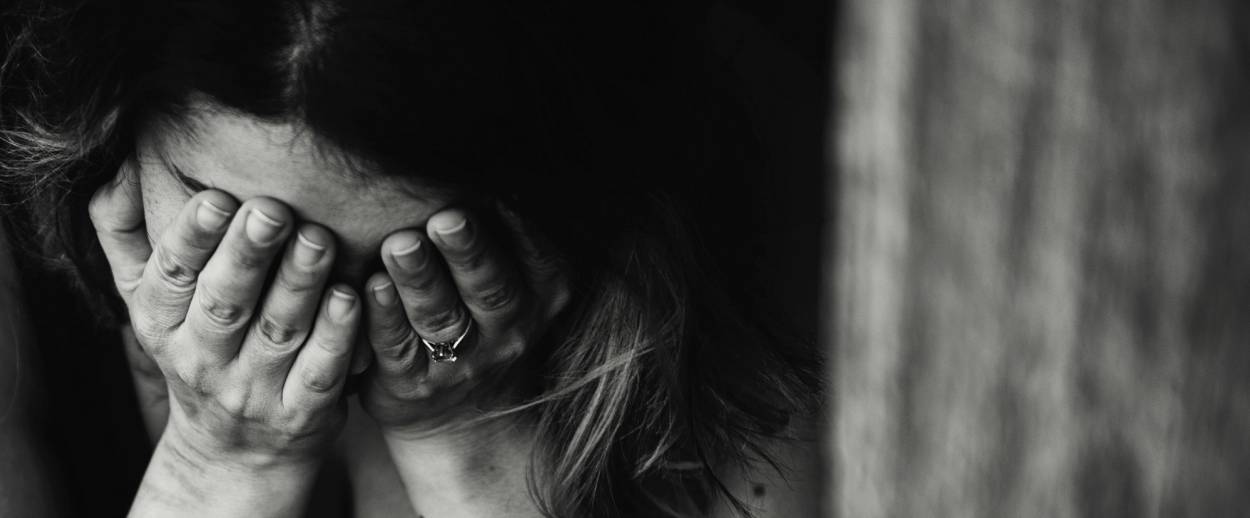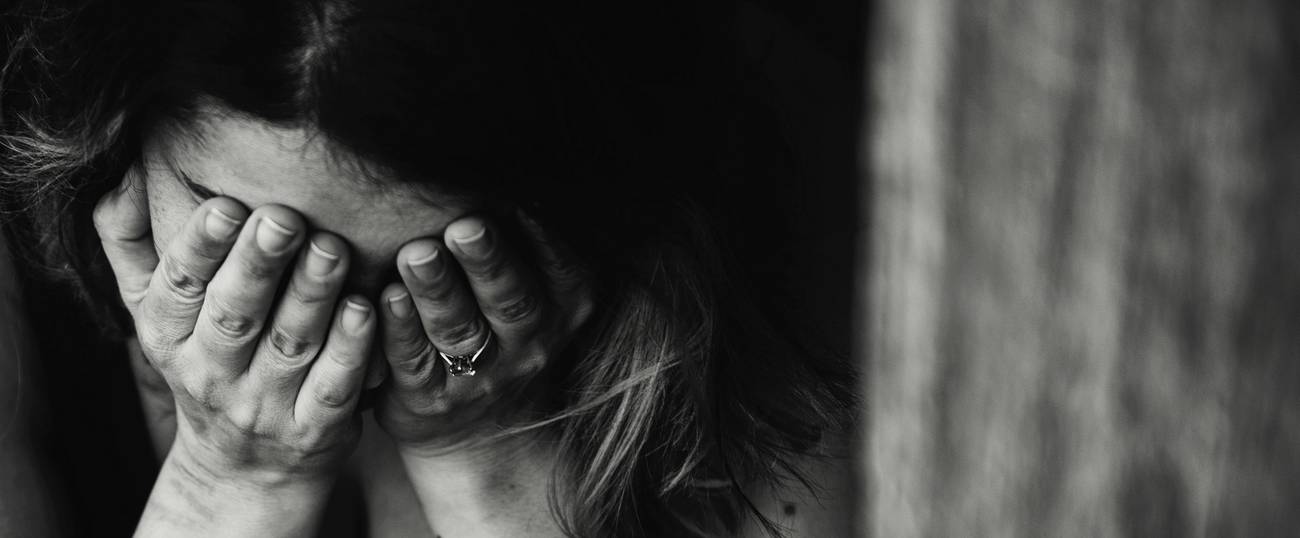What Happens When You’re Quarantined With Your Abuser?
What Happens When You’re Quarantined With Your Abuser?




Across America, we are grappling with the coronavirus and the struggle to contain it. Schools have shut down in 29 states and the District of Columbia. Large gatherings are being banned. Synagogues are closing, and even Shiva calls are being moved online. We are learning new terms like social distancing and flattening the curve. We are being urged, including by the editors of Tablet, to do our civic duty and help slow the spread of the virus by limiting our social interactions. This is the way we can help our health system respond to the virus and help stop the spread of the disease to the most vulnerable.
The overwhelming message is to stay home. But what if your home is the most dangerous place to be?
Approximately 1 in 3 women and 1 in 10 men are victims of domestic abuse. One in 4 women will be victims of severe violence by an intimate partner in their lifetime. Too many in our community still believe that the Jewish community is immune to domestic violence, a nasty side effect of the “nice Jewish boy” construct. Nothing could be further from the truth. A Jewish Women International Study found that 15% to 25% of American Jewish households are experiencing violent abuse. A Yale University study found that Jewish women were staying in abusive marriages twice as long as their non-Jewish American peers. All types of abuse, physical, sexual, emotional, financial and spiritual, exist in the Jewish community across all religious and ethnic lines.
The bottom line is you probably know someone in your community who is terrified not just of the virus, but at how much isolated time they will spend with their abuser.
Tackling such a complex and frightening public health problem is daunting. Fortunately, the experts at the Jewish Coalition Against Domestic Abuse are working with victims of abuse to help them stay safe during this time of increased social isolation and increased contact with their abuser. They are using their emergency hotline (1-877-88-52232) to help victims of domestic violence prepare personal and highly individualized safety plans designed to disrupt abuse and reduce harm.
When a woman calls, after confirming that she is in a safe space to talk, staff offer support and help her create a plan.
“Our client is the expert in their situation, they know their abusers and their abuse and violence better than we do,” said Cortney Fisher, the deputy director of JCADA. Safety planning works with the client to identify their specific needs, what they are afraid of, and what concerns them the most about being alone with their abuser. Staff at JCADA then work with the client to identify what triggers the abuser to engage in abuse and game out how those triggers can be avoided. This might include avoiding certain topics of conversation. This can be a slow and painful process, particularly for women who have become isolated by abusers and struggle to talk about the abuse they are coping with.
The next step is deciding what to do if the abuse cannot be avoided and needs to be disrupted.
“Who are the trusted friends, family, and coworkers who I can contact during this period of quarantine?” Fisher said. “Is there a code word you can have with those friends, family, coworker, if you call them and say the word lamp, for example, they know you are in danger and they might need to call for help or show up at your house? This might be a female leader, a mikvah attendant or a rebbetzin that you trust. The code word lets them know to come over, and it disrupts the abuse.” There should ideally also be a code word that lets the trusted confidant know to call the police, she added.
While this may seem risky, putting another person in the path of the abuser, it is actually a proven way to diffuse the situation.
“Say the abuser goes on a tirade and yells and screams and calls names and you call this person, whoever it is, it could be your mom, the next-door neighbor, your rabbi, whoever you feel safe with, and you say lamp, and they know they can just show up at your house and bring some food. Abusers are typically very mindful about how and when they are using abusive behavior, whether it is verbal, physical, financial or spiritual. When another person comes into space, they will change their behavior. The abuser does not want the community to know that this is what’s happening within the home.”
A key factor here is keeping the abuser in the dark about the plan, especially given how abusers are generally secretive about their behavior. “If the abuser knows the victim called for help,” Fisher said, “it increases the danger to the victim.”
Keeping the victim as safe as possible, disrupting abuse, and mitigating harm is JCADA’s goal. While JCADA provides clinical and legal services, including for anyone wanting to leave, that is not the purpose of these calls. JCADA staff provides support, safety planning, and absolutely no judgment: They are there to help victims of domestic violence plan and cope with spending increased isolated time with their abuser, not pressure victims to leave.
“Very few people who call us want to leave the home,” Fisher said. “That is not the situation. They are calling because they have an immediate need that needs to be addressed. The most dangerous time for a victim of abuse is when they decide to leave. That’s the primary reason we never pressure somebody to leave. It is not up to JCADA to decide what happens, it is up to the victim, and we would never encourage them to leave without a safety plan or before they are ready to do so.”
I know some may find these attempts at harm-reduction insufficient. Why focus on disrupting abuse instead of ending it? Why not pressure victims to leave and jail abusers? Why all this focus on mitigation instead of a long term solution? There are several reasons.
First and foremost, the most dangerous time for a victim of abuse is when they seek help to end the abuse. That exposes the abuse which enrages the abuser. This greatly increases the lethality of abuse. Simply put, pressuring a victim to leave an abuser without a safety plan in place could get them killed. Secondly, many victims of abuse don’t want to leave or are not in a position to leave. Pressuring them to leave is unlikely to change their mind, but it may keep them from reaching out for help again. The priority here is to disrupt abuse and protect victims. If a victim of domestic violence reaches out to you and you pressure them to leave, they may not reach out again. In the meantime, JCADA is currently finding an increase in lethality, including strangulation requiring medical treatment. While mitigation, abuse disruption, and harm reduction may seem woefully inadequate, they are in fact effective, lifesaving tools for those living with abuse.
As our community continues to come up with plans to meet the extraordinary challenges of this outbreak, we mustn’t forget the most vulnerable in our midst. Jewish communal leadership must incorporate resources for domestic violence victims into our messaging on coronavirus. When we share info about closed schools, closed synagogues, virtual gatherings and more, let us also share information for victims of domestic violence. A small line at the end of the email can disrupt abuse and potentially save a life.
We need to send a clear message to victims of domestic violence who are coping with abuse and a pandemic: Even if you are physically distant from your community and spending more time with your abuser, you are not alone.
Carly Pildis is the Director of Grassroots Organizing for the Jewish Democratic Council of America, and an advocacy professional based in Washington, D.C. Her Twitter feed is @carlypildis, and her website is www.carlypildis.com.